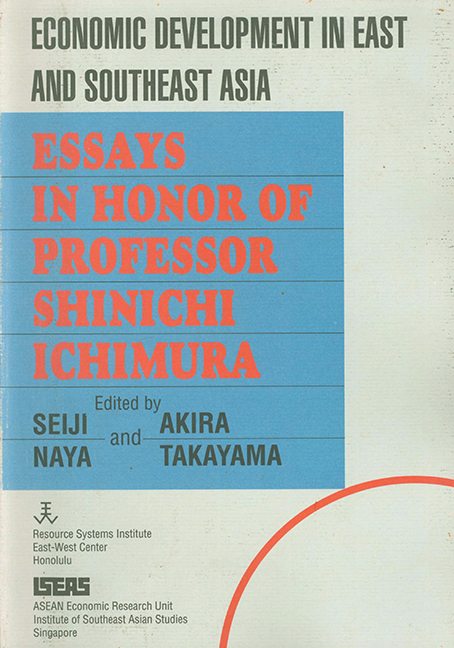Book contents
- Frontmatter
- Preface
- Shinichi Ichimura, 1925-
- CONTENTS
- Introduction
- Contributors to This Volume
- I Structural Change and Economic Development in Developing Asia in the 1990s
- II Explaining the Success of the Four Little Dragons: A Survey
- III Taiwan's Economic Miracle: A Singaporean Perspective
- IV Singapore's Experience of Industrial Restructuring: Lessons for the Other Asian NIEs
- V Korean Industrial Policies for Declining Industries
- VI Vietnam: Recent Economic Developments and the World Economy
- VII Transition from Import Substitution to Export Expansion: The Thai Experience
- VIII Adjustment Problems of a Small Oil-Exporting Country: Did Indonesia Suffer from the Dutch Disease?
- IX A Quarterly Econometric Model of the Hong Kong Economy
- X The Effect ofRicardian Rent Extracting on Macroeconomic Performance
- XI Direct Foreign Investment and the Economic Development of Korea
- XII Japanese Investment in Thailand: Looking Back and Into the Future
- XIII The Effects of Direct Foreign Investment on Taiwan: A Macroeconometric Investigation
- XIV A Reform of the Foward Foreign Exchange Market and Foreign Exchange Rate Determination Policy in Korea, with Foreign Exchange Policy Experiences of Taiwan
- XV Interest Rate and Foreign Exchange Liberalization in Taiwan in the 1980
- XVI Manifold Dilemmas behind External Debt Management
- XVII Agricultural Growth and Food Imports in Developing Countries: A Reexamination
- XVIII The Transformation of Rural Asia and Economic Development Theory and Policy
- XIX The ASEAN Summit and ASEAN Economic Cooperation
- XX The Role of Developing Countries in the New GATT Round
- XXI The Emerging Global Economy and the Role of the Asian NIEs
- Index
XX - The Role of Developing Countries in the New GATT Round
Published online by Cambridge University Press: 21 October 2015
- Frontmatter
- Preface
- Shinichi Ichimura, 1925-
- CONTENTS
- Introduction
- Contributors to This Volume
- I Structural Change and Economic Development in Developing Asia in the 1990s
- II Explaining the Success of the Four Little Dragons: A Survey
- III Taiwan's Economic Miracle: A Singaporean Perspective
- IV Singapore's Experience of Industrial Restructuring: Lessons for the Other Asian NIEs
- V Korean Industrial Policies for Declining Industries
- VI Vietnam: Recent Economic Developments and the World Economy
- VII Transition from Import Substitution to Export Expansion: The Thai Experience
- VIII Adjustment Problems of a Small Oil-Exporting Country: Did Indonesia Suffer from the Dutch Disease?
- IX A Quarterly Econometric Model of the Hong Kong Economy
- X The Effect ofRicardian Rent Extracting on Macroeconomic Performance
- XI Direct Foreign Investment and the Economic Development of Korea
- XII Japanese Investment in Thailand: Looking Back and Into the Future
- XIII The Effects of Direct Foreign Investment on Taiwan: A Macroeconometric Investigation
- XIV A Reform of the Foward Foreign Exchange Market and Foreign Exchange Rate Determination Policy in Korea, with Foreign Exchange Policy Experiences of Taiwan
- XV Interest Rate and Foreign Exchange Liberalization in Taiwan in the 1980
- XVI Manifold Dilemmas behind External Debt Management
- XVII Agricultural Growth and Food Imports in Developing Countries: A Reexamination
- XVIII The Transformation of Rural Asia and Economic Development Theory and Policy
- XIX The ASEAN Summit and ASEAN Economic Cooperation
- XX The Role of Developing Countries in the New GATT Round
- XXI The Emerging Global Economy and the Role of the Asian NIEs
- Index
Summary
Introduction
In the past, and for a variety of reasons, participation by developing countries in the General Agreement on Tariffs and Trade (GATT) has been minimal. However, as a result of changes in the international trading environment and the slowdown in world output and trade growth, the developing countries have generally taken a greater and more active interest in the Uruguay Round that was launched in September 1986. But the developing countries have not reached an overall consensus on the level of involvement and the positions they will take on the issues being discussed in the GATT negotiations. This is not surprising given the wide range of topics on the Uruguay agenda and the diversity within the developing countries.
Nonetheless, it is imperative that the developing countries continue their participation in the negotiations. If the developing countries hesitate to take part in the latest GATT round, or if they enter only with a defensive stance with respect to their old rights, little will be gained. There is an even greater danger in that the industrialized countries may agree amongst themselves and leave the developing countries out in the cold.
The trend towards regionalism, especially by the United States and the European countries, is particularly alarming and will likely have a significant impact on the Uruguay Round and the position of the developing countries in the global market. The impending consolidation of the European countries in 1992 and the recent increase in U.S. bilateral arrangements, in particular the U.S.-Canada Free Trade Area pact, raises questions as to the commitment of these countries to the multilateral framework and the chances of success in strengthening the GATT system. Moreover, the trend towards regional blocs implies a closing of markets for developing country exports.
Developing Countries' Passive Participation in Past GATT Rounds
Although GATT is a post-World War II organization that is related to the United Nations, many developing countries that became independent after the war did not become GATT members until much later. For example, while Indonesia became a member of GATT early in its independence in 1949, the Philippines did not join until the end of the Tokyo Round in 1979. Thailand's membership was even later in 1982. Big oil countries such as Saudi Arabia and Venezuela are not members at all. Mexico has only just acceded to the GATT, and China will participate in the latest round as an observer.
- Type
- Chapter
- Information
- Economic Development in East and Southeast AsiaEssays in Honor of Professor Shinichi Ichimura, pp. 307 - 318Publisher: ISEAS–Yusof Ishak InstitutePrint publication year: 1990



